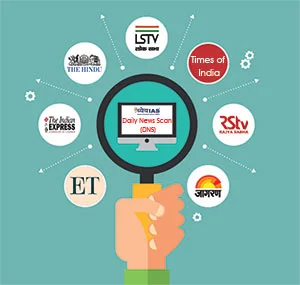(Daily News Scan - DNS English) What is Non Personal Data?
In a government committee formed under the IT Ministry comprising of 9 members headed by Infosys co-founder Kris Gopalakrishnan suggestions have been made regarding non-personal data.
The non-personal data generated in the country should be allowed to be harnessed by various domestic companies and entities. The committee, has asked the public to send in their suggestions as well. The committee has also suggested setting up of a new authority which would be empowered to monitor the use and mining of such non-personal data.
In this DNS we will know about non personal data and how sensitive can it be.
The committee has called for data regulation that would require sharing of data that is anonymised, or “non-personal”, to help Indian companies and governments.
Now let’s just first understand what non personal data is-
Non-personal data is any set of data which does not contain personally identifiable information. This means that no individual or living person can be identified by looking at such data. Or no information that is associate to a specific person is available in that data.
For example, while order details collected by a food delivery service will have the name, age, gender, and other contact information of an individual, it will become non-personal data if the identifiers such as name and contact information are taken out.
The government committee was formed in September last year
and comprises of industry, government and academic experts. Committee submitted
its report and has classified non-personal data into three main categories.
These categories namely are- public non-personal data, community non-personal
data and private non-personal data. These three categories have been divided
depending on the source of the data and whether it is anonymised in a way that
no individual can be re-identified from the data set.
All the data that is collected by government and its agencies such as census, data collected by municipal corporations on the total tax receipts in a particular period or any information collected during execution of all publicly funded works has been kept under the umbrella of public non-personal data.
Any data identifiers about a set of people who have either the same geographic location, religion, job, or other common social interests will form the community non-personal data. For example, the metadata collected by ride-hailing apps, telecom companies, electricity distribution companies among others have been put under the community non-personal data category by the committee.
Private non-personal data can be defined as those which are produced by individuals which can be derived from application of proprietary software or knowledge.
Unlike personal data, which contains precise information about a person’s name, age, gender, sexual orientation, biometrics and other genetic details, non-personal data is more likely to be in an anonymised form.
However, in some specific categories such as data related to
national security or strategic interests such as locations of government
laboratories or research facilities, even if provided in anonymised form can be
dangerous.
Similarly, if the data is only about the health of a community or a group of
communities, though it may be in anonymised form, it can still be dangerous, the
committee opined. As per the committee “Possibilities of such harm are obviously
much higher if the original personal data is of a sensitive nature. Therefore,
the non-personal data arising from such sensitive personal data may be
considered as sensitive non-personal data.”
On the global level, in May 2019, the European Union suggested regulation framework for the free flow of non-personal data in the European Union. In this it suggested that member states of the union would cooperate with each other when it came to data sharing.
However, the regulation had not defined what non-personal data constituted of.
With respect to other countries, several countries across the world, have no nationwide data protection laws, whether for personal or non-personal data.
The expert committee have only made a draft for now. Though the non-personal data draft is a pioneer in identifying the power, role, and usage of anonymised data, there are certain aspects such as community non-personal data, in which the draft could have been clearer.
Some other experts also believe that the final draft of the non-personal data governance framework must clearly define the roles for all participants, such as the data principal, the data custodian, and data trustees.
As per the panel report sharing non-personal data collected by both government and private organizations with citizens is likely to lead to increased transparency, better quality services, improved efficiencies, and more innovation.
The report also mentions that sharing of the non-personal data might be useful for Indian entrepreneurs to develop new and innovative services and products which will be beneficial for the citizens.







